Organic garden in Navarrevisca: urbanites cultivating
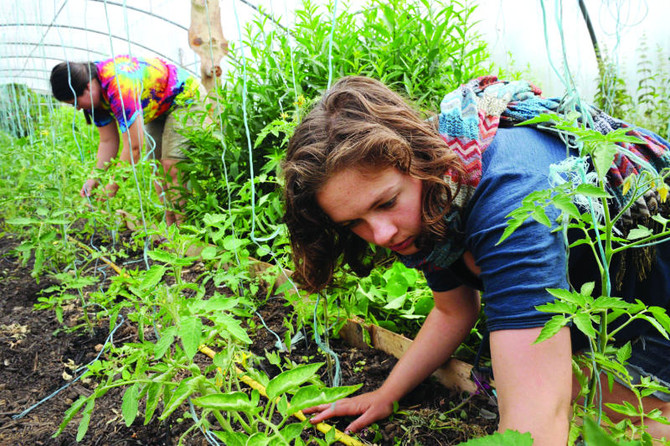
We continue with our desire to show you orchards around the world! With a little delay (since I visited this garden in July and August) today I present Antonio’s organic garden in Navarrevisca (Ávila, Spain).

I already told you a little about this town in the Sierra de Gredos in the Navarrevisca post and its ecological initiatives: the gardener’s fair, so if you haven’t seen it I recommend you take a look at it, this event they organized is very interesting!
If you have entered the category «Orchards around the world» you will have seen that we have done a lot of reports on orchards, but the truth is that this has been one of the ones that I liked the most. It is unbelievably big, very beautiful and neat, and has a lot of different vegetables and greens. I have learned a lot from the visit to this organic garden and I thank Antonio for teaching me about it and for his patience.
Why do city people cultivate organic gardens?
Although Antonio was born in this town in the mountains, we could say that he is a city man. He has lived and worked all his life in Madrid, he had been buying fruit and vegetables in the supermarket for years, and he has not been directly related to agriculture, nothing more than in his childhood.
So… Why did this “city” man start cultivating an organic garden? Well, because we already saw in the post Benefits of orchards, that they are a source of life and wisdom… as that Chinese proverb used to say (and now that we are in Beijing, it comes to mind…):
If you want to be happy one day, get drunk;
If you want to be happy for a year, get married;
if you want to be happy all your life, grow a garden
As Antonio told me, in addition to the taste of the food, which is incomparable, he likes to have his own organic garden because it entertains him a lot and helps him disconnect from the stressful pace of life in Madrid. For him, «working» in the garden is not work, and although he spends there 8 or 10 hours a week,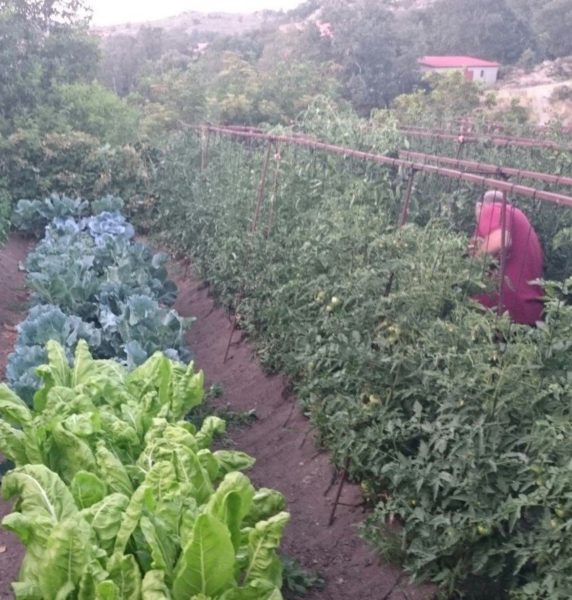 enjoy doing it, and more than a chore it is a relaxing and very satisfying leisure activity.
enjoy doing it, and more than a chore it is a relaxing and very satisfying leisure activity.
He told me that he had never grown anything before until he decided to start his organic garden, and that he didn’t know much about plants or agriculture either, except what he remembered from when his mother grew a small garden at home many years ago. So… Anyone can do it? Of course!! «Just as I have learned by reading, asking other gardeners, getting information on the internet… anyone can grow an organic garden.» From here we encourage you to decide to cultivate an organic garden, a small flowerpot or to participate in one of the community or neighborhood gardens in your city.
What’s in Antonio’s organic garden
This garden has it all! From vegetables and assorted vegetables, to small red fruits, through aromatic and even fruit ! (there is a pear tree and a lemon tree too).
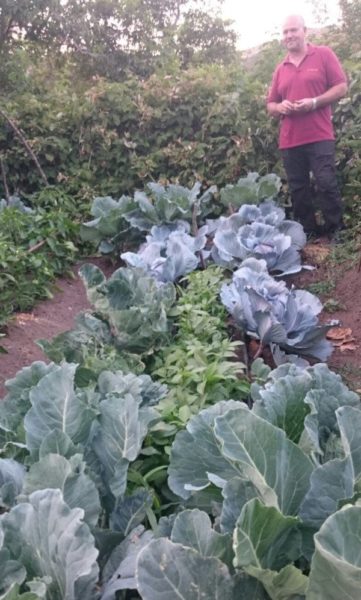
In the photo on the right there are cauliflowers and broccoli (at the beginning and to the left of the terrace), red cabbage (the vegetable with large purple leaves on the right), cabbage and, in the center, a plant that I got to know thanks to Antonio but that seems very interesting: the Molokhía. It is a plant that comes from Egypt and Palestine, and is widely used in Egyptian cuisine and in other East African countries. In addition to its culinary use, Molokhía has good nutritional properties, health benefits, and medicinal properties.
The star of the vegetable garden par excellence are the tomatoes since there are more than 15 different varieties!!!! In the next post I will show you the reason for each one and some tricks to grow them.
There are also green beans, various kinds of lettuce (Oak Leaf, Pink Lollo and Golden Spring Vatavia), Swiss chard, lilies such as celery and onion, purple basil (which is very rich in salads and which Antonio plants at the beginning and at the end of tomato and pepper beds to help prevent whitefly and other pests, as we saw in the post on Aromatics in the garden: which ones and why).
Tips and tricks for the organic garden
Now I will tell you about some of the good ecological practices that Antonio carries out in his orchard and, thanks to which, according to what he tells me, he has practically no problem with pests and diseases (many of them we have already seen in other Agrohuerto posts). so I will limit myself to leaving you the links):
- Drip irrigation: the water is used better since there is less evaporation and, in addition, the risk of fungi is reduced.
- Favorable crop associations: what I have told you about basil is an example. Another, associate onions with lettuce, since their usable part is different (root and leaf) and they are perfectly compatible since their nutrient requirements complement each other.

- Crop rotation: where there are tomatoes or peppers (nightshade) the following year, plant leaf or root vegetables (such as cabbage, onion, celery…) or legumes such as beans to enrich the soil.
And here the post today! In the next one, Organic Tomatoes: varieties and tricks to grow them, I will tell you about how they are grown in this cold climate town in the Sierra de Gredos.

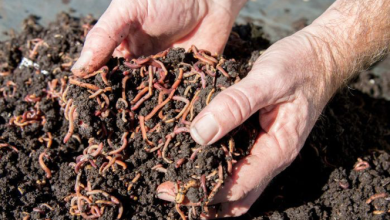
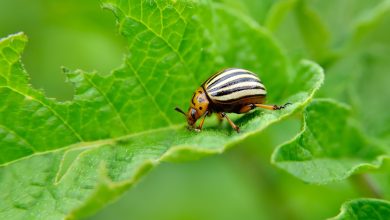
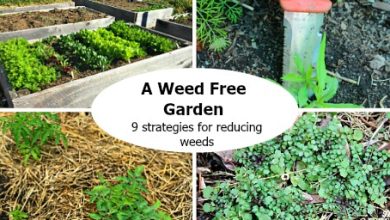
![Photo of Plant Andean Maca: [Pests, Irrigation, Land Preparation and More]](https://www.complete-gardening.com/wp-content/uploads/2022/08/plant-andean-maca-pests-irrigation-land-preparation-and-more-390x220.png)